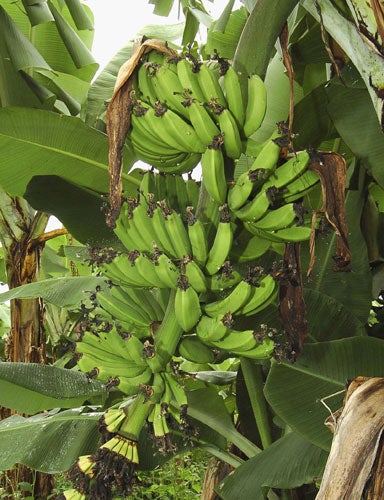He's not bananas, just first to grow them in a UK home
Plant enthusiast in revolutionary 'eco-house' stuns admiring experts of the Royal Horticultural Society

Your support helps us to tell the story
From reproductive rights to climate change to Big Tech, The Independent is on the ground when the story is developing. Whether it's investigating the financials of Elon Musk's pro-Trump PAC or producing our latest documentary, 'The A Word', which shines a light on the American women fighting for reproductive rights, we know how important it is to parse out the facts from the messaging.
At such a critical moment in US history, we need reporters on the ground. Your donation allows us to keep sending journalists to speak to both sides of the story.
The Independent is trusted by Americans across the entire political spectrum. And unlike many other quality news outlets, we choose not to lock Americans out of our reporting and analysis with paywalls. We believe quality journalism should be available to everyone, paid for by those who can afford it.
Your support makes all the difference.A plant enthusiast has shaken the horticultural world after successfully growing dozens of bananas in a British domestic property for what is believed to be the first time. Mike Hillard, 64, bought three musa japonica plants two years ago to provide shade at his energy-efficient home, Tranquility, in Stroud, Gloucestershire.
But despite being told they would not bear fruit, the property development managing director can now gaze up at 16ft (five metres) of growth bearing more than 70 bananas. Mr Hillard, who has grown plants since he was 11, was surprised when the plants flowered and and stunned when they then produced four "hands" of fruit, each holding about 18 bananas.
He called the Royal Horticultural Society (RHS) who said the news was so rare he "should get down on the prayer mat". The RHS has told him is the only person in Britain known to grow bananas in the home.
The bananas bloomed in his hi-tech solar room, which stays between 10C and 16C above outside temperature all year, and is just warm enough for the east Asian crop to grow healthily.
Now Mr Hillard intends to fry them up in a tasty curry. He said: "This has all been done by the English sunshine in my solar room, which provides my house with an oxygen-rich atmosphere.
It has been called the most energy-efficient house in the world. I was surprised when they flowered because I was told, 'Oh they'll never grow fruit'. Now they are growing into a forest, and I've got seven babies. I asked the Royal Horticultural Society and they told me to get down on my prayer mat because they had been trying for years to get theirs to bear fruit. Mine have grown to four or five inches and they are edible.
"Perhaps there is a Lord somewhere who has done it too but I don't know where he is. It looks like a giant beehive and the trunk is full of water. You would call it a palm. The leaves grow about 5.5m up, nearly touching the roof."
He said that he would be cooking the bananas in a slap-up meal despite the RHS's warnings that the fruit will taste odd. He said: "I love bananas and will probably cook them like a plantain; they will be very nice fried with rice."
Mr Hillard says he is "taking on" the scientific community's findings about global warming, saying the problem is much more advanced than accepted wisdom suggests.
Leigh Hunt, the Royal Horticultural Society's principal horticultural adviser, confirmed that Mr Hillard was probably the first British grower to achieve the feat in a house. He said: "This is likely because he was growing musa basjoo [the Japanese banana], a species that wasn't grown very often in the UK until the fashion for tropical gardens came in.
"So while it has been perfectly possible to flower musa basjoo in tropical glasshouses, such as at Kew, but it has been unlikely for amateurs to grow it because they weren't sold very often and gardeners had little interest in growing them because they required mollycoddling during the winter [they are not fully hardy].
"Unfortunately, the fruits that musa basjoo produce are unpalatable, mainly because they contain seed. Ripening may not happen as the low light levels of a British winter are not conducive for good growth. Commercial bananas don't contain seeds because they are generally the seedless variety, dwarf Cavendish."
Mr Hillard, a pioneering environmental architect, designed Tranquility as a four-bedroom "eco-house" made of Cotswold stone, which has total annual energy costs of less than £150 a year.
The former naval officer wrote his first environmental paper aged just 18 and has written several books addressing environmental issues, including climate change, food and poverty. Heating the house last year cost just £60 and he uses rainwater for showering and washing up.
Last month, Graham and Daphne Bath, from Hampshire, revealed that a banana tree they had been growing in their garden for the past nine years had borne fruit for the first time.
Join our commenting forum
Join thought-provoking conversations, follow other Independent readers and see their replies
Comments